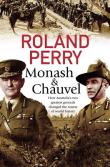 5191035455991798510.jpg
5191035455991798510.jpg
 Monash and Chauvel : How Australia's Two Greatest Generals Changed the Course of World History
single work
Monash and Chauvel : How Australia's Two Greatest Generals Changed the Course of World History
single work
 5191035455991798510.jpg
5191035455991798510.jpg
 Monash and Chauvel : How Australia's Two Greatest Generals Changed the Course of World History
single work
Monash and Chauvel : How Australia's Two Greatest Generals Changed the Course of World History
single work
'The two most outstanding battle commanders on the Allied side at the Western and Middle Eastern Fronts were Generals John Monash and Harry Chauvel. They met and formed an unlikely bond in the cauldron of Gallipoli and went on with their armies to be dominant in the two biggest Fronts of the 1914-1918 War.
'John Monash, on the Western Front in Europe commanded the Australian Imperial Army (AIF)—the biggest single army Corps on the Allied side and six times the size of Australia’s current Defence Force. At the most critical time of the war in 1918, he masterminded victory over two German armies at the battle of Amiens in Northern France, which the German High Command conceded ended their chances of winning the overall conflict. In the war against the Ottoman Empire in the Middle East, Harry Chauvel led the 34,000-strong Desert Mounted Column. Realising he would have to ignore the command directives of superiors, he took the initiative in planning battle tactics to defeat the Turks in the Sinai in August 1916; at Beersheba in October 1917; and in the final 1918 drive to push the Turks right out of the Middle East.
'Monash and Chauvel planned thoroughly and acted with the best interests of the soldiers under their command. This is the fascinating story of how their capacities and attitude presented a winning formula for their armies and ensured that they never lost a battle they planned and executed.'
Source: Publisher's blurb.
'The legend of Gallipoli may never be eclipsed but recent celebrations have accentuated the heroes of the Western Front and the Middle East. The gallantry and sacrifice of our Diggers is legendary but we should also honour two of World War I’s most outstanding field commanders, both Australians: John Monash and Harry Chauvel.' (Introduction)
'The legend of Gallipoli may never be eclipsed but recent celebrations have accentuated the heroes of the Western Front and the Middle East. The gallantry and sacrifice of our Diggers is legendary but we should also honour two of World War I’s most outstanding field commanders, both Australians: John Monash and Harry Chauvel.' (Introduction)